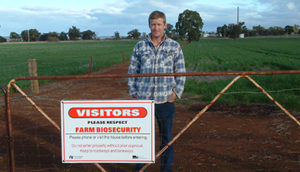Read the latest information on
Foot-and-mouth disease
 Thomas Hill has a simple philosophy when it comes to on-farm biosecurity: everything enters and leaves the property clean.
Thomas Hill has a simple philosophy when it comes to on-farm biosecurity: everything enters and leaves the property clean.
Tom Hill is a partner and manager at his family-owned farm of 1500 hectares of crops, and oversees 200 hectares of pasture for Merino ewes in a prime lamb venture.
“We don’t want to take weeds or diseases onto any other property and we don’t want them to arrive on ours,” Mr Hill says.
As a partner and manager at his family-owned farm at Colbinabbin, Victoria, he oversees 1500 hectares of crops and 200 hectares of pasture for Merino ewes in a prime lamb venture, as well as doing his share of driving headers in a contract harvesting business run from the farm. Mr Hill’s dedication to implementing best-practice biosecurity standards at ‘Colbinabbin Hills’ have seen him named as a finalist in the Biosecurity Farmer of the Year Award (animal category).
The Hills’ operation employs a wide range of biosecurity measures, including air compressors and high pressure cleaners, staff training, record keeping and research.
Vigilance is a top priority, with a surveillance visit from an agronomist every two weeks and regular (passive) surveillance from Mr Hill and the family.
“One difficulty was keeping up cleaning the machinery when we were flat out at harvest,” Mr Hill said.
“It would be easy to let standards slip but we don’t want to be responsible for spreading anything.
“We have all sorts of weeds on our place and other lease farms, the most challenging one being wild radish, which makes it so important we keep on top of our biosecurity.”
He is also impressed with the efforts of neighbours in the area: “If the whole district does it, it looks good for the industry. People can drive past and see clean fence lines and not paddocks full of burrs as they drive by.
“A little bit of time spent doing the little things, although inconvenient, will pay dividends later – but these aren’t always obvious at the time.”
Duncan Rowland, Manager of Biosecurity Planning and Implementation at Animal Health Australia, said that judges were impressed with Mr Hill’s integration of biosecurity across a varied and mixed enterprise.
“It is especially commendable that this was done in the absence of specific or immediate concerns,” Mr Rowland said.
“It really shows Thomas’s recognition of the need for biosecurity to ensure future profitability and protection of the family’s assets.”